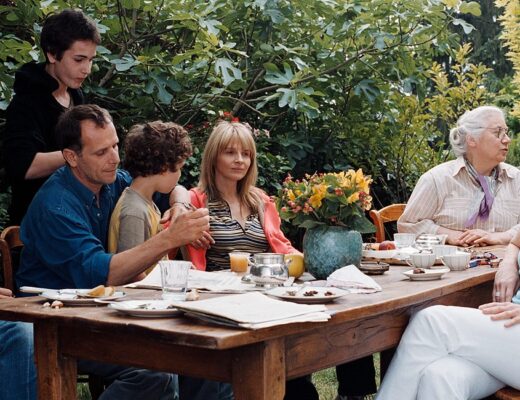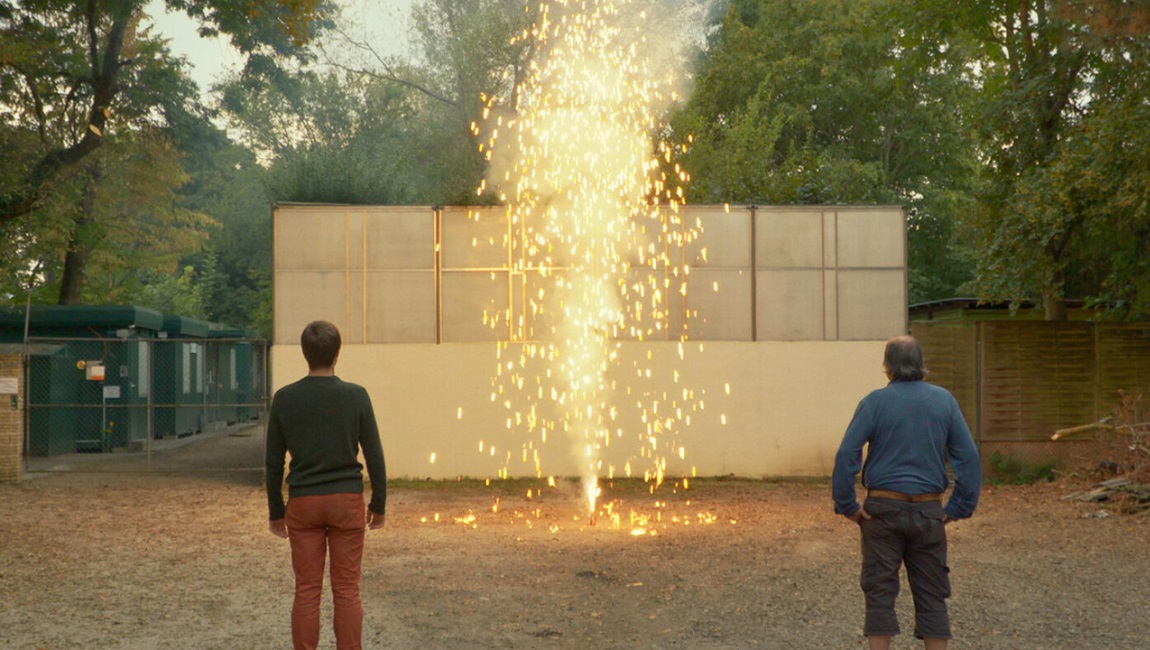A spectral trilogy concludes under refracted conditions in Christian Petzold’s diagnostic landscape of 20th Century anxieties, which actualizes the magical realist gestures methodically peppered throughout his last two projects, Phoenix and Transit. This development has evinced the increased crystallization of a certain kind of ghost story, one fixated, primarily, on a historicism that has mapped recent German politic, telegraphing toward a self-alienation in a nostalgic response to modern, culturally persistent guilt. Of course, Petzold is not the least bit interested in romanticizing this yearning for dead history, but rather his concern lies in how that through-line of thought, and connection to such volatility, has determined manners of reflexivity. The portraits he has displayed in these most recent films offer only vacancy in characterizations, alongside a muted agitation in hoping one might eventually find their own once segregated from such inner-turmoils each player seems to tenaciously evade; hence, these three works are rendered as ‘love’ stories.
Most important to consider within this context is the utility of history as a device and its simultaneous scrutiny of the contemporaneous. With Phoenix, the stage is set following the collapse of the Third Reich, during a period of deep reconciliation and complacent silence as the atrocities of war find light. Nelly (Nina Hoss) returns to her husband, a German who had supposedly given her up to the SS, forcing her into Auschwitz. Having undergone facial reconstruction due to injuries, she begins to insert herself into a pre-war role, beside the man she must love, smitten both by nostalgia and fear of confronting a future fated by this cultural halt and fascist unveiling. History, here, exists to direct, to recreate itself as an idealized cyclicality, a utopian vision rendered through the eyes of a victim who sorely believes the future is incompatible with peace. Petzold achieves a near materialization of history as object, elixir, wherein immobility enables liberty. Such a perspective, he knows, is but blind mysticism.
Petzold’s intertextual thesis comes to a fore with Transit, a film of two overlapped realities: one aesthetic, the other period. In Transit, we find an analog orchestration of WWII, set amongst the technology and architecture of a modern world. Georg (Franz Rogowski) takes on the identity of a deceased writer, in order to utilize his VISA and flee to Mexico. However, becoming a ghost, for him, leaves a footprint, as Marie (Paula Beer), the writer’s wife, finds herself on his paper trail. What transpires are intersections of lust and (again) guilt, a physical enactment of the passions and confusion that whirl around Nelly’s psyche in Phoenix as her husband stares at her with blank eyes, his past erased, his future non-existent, an embodied stasis of contrition. The use of modern aesthetic in Transit elaborates on the stagnancy Phoenix begins to articulate. These two films, one retrospective, one reflexive, converse on the lingering effects of tyranny, the psychological rollout, portrayed in gestural signifiers, always fleeting and never requited. Georg falls in love, appropriating the identity he has stolen, forced into a purgatory where, perhaps forever, he’ll seek out the phantasm of Marie, returning to the same bar, perpetuitously looking shyly over his right shoulder, never seeking emancipation from the inevitable collapse.
Undine, also starring Rogowski and Beer as a duo entrapped in a doomed affair, observes the democratic reformism of Berlin infrastructure post-Wall. A heavy emphasis is placed on the historicity of the city’s development, as Beer’s character, Undine, a historian, is employed as a Museum guide who, throughout, articulates the trajectory of the city’s growth, noting the both remnants of a split city and what has been built from the rubble. The politics surrounding an East/West Berlin do not take prominence here; rather, their influence lies in situating a societally-bred lack of individual identity. Rogowski’s character is one whose career surrounds the ruins of an old Berlin, his underwater surveyance interrogating the shadows under the guise of mystification, an arrested admiration for a disappeared beauty, neither contextualized nor reckoned with. The film begins with a spiritual murder, the consequences of which lay themselves bare over the film’s unfurling design. Similarly to Petzold’s previous works, such an act, in close relationship with a kind of death, is quickly followed with replacement, an immediacy bereft of personal reconciliations; the future can’t find space to exist.
How this film operates within the oscillation of its plot mechanisms is a more uniquely developed, perhaps slightly misguided direction for Petzold to seek. Its transparent confrontation of the magical also highlights much of the ambiguity and emotional ambivalence only previously gestured toward in Petzold’s prior works. Here, as the ghost story is literalized, an affinity for enigma resigns itself to more classically structured narrative progression. Where modernist tactics apply to both Phoenix and Transit, such a detour is likely a product of emancipatory praxis, developed through the seizure of character arcs that always feel directed toward a potential confrontation of their history. Though the dramaturgy feels slighted, the resonance of seeking remains rather moving. Though all of the guilt and unsettled sentiments remain lingering, their sensations take place in the physical specters that embody these characters. That development is, undoubtedly, an attempt at denying the comforts of stasis, rejecting the pillowing that cascades over you whilst under the influence of nostalgia.
Where these three films articulate their coalescence most acutely is in the dissemination of magical realist aesthetics. Phoenix exists within a surface realm of the uncanny, Nelly’s transformation and transmogrification into a new person, under a new psychical identity, untethers her from her own history. A ghost materializes in her already-filled shoes, stepping in tandem, absolving her of autonomy. Transit pushes further, the incongruity of time and aesthetic coupling with Georg’s final, fleeting visions of the dead — this world is baked under false pretenses, an “irreducible moment,”1 defined as an element of inherent contradiction that an audience is forced to reconcile with. Finally, Undine, a work of diegetic ghosts and resurrections, all amplified alongside imagery of a still-restoring Berlin, history in direct contact with its manifest spirit. Petzold’s trajectory has watched the shadows of the 20th century cast themselves onto the 21st, their estranged positionality provoking works of melancholic contemplation and reflexive scrutiny. His sights on historical determinism are most ably suggested, as Undine states, “In the center of Berlin now stands a museum built in the 21st century, in the form of an 18th-century ruler’s palace…The deceptive part lies in the hypothesis that this makes no real difference, which is the same as claiming that progress is impossible.” Naturally, such an explicit communication proposes that this is only a half-truth, for all verities remain unspoken within a Petzold film. Truths are instead acted upon, and where Undine culminates is in the submission that, much like in the now-celebrated coda of Phoenix, new histories can be sought elsewhere, in maturation with the past, for such values of growth and critical rapprochement are not mutually exclusive. After all, these films, each, are adaptations.
1 Faris, Wendy B. Ordinary Enchantments: Magical Realism and the Remystification of Narrative. Nashville (Tenn.): Vanderbilt University Press, 2004.
Published as part of Berlin International Film Festival 2019 | Dispatch 2.







